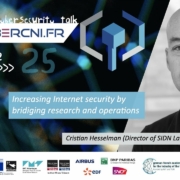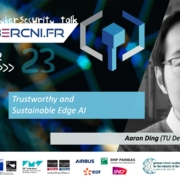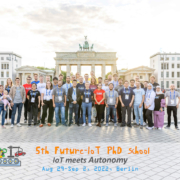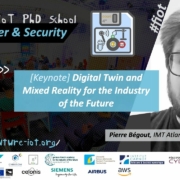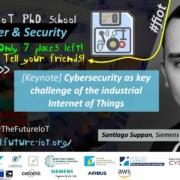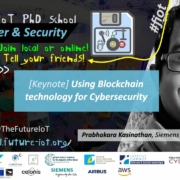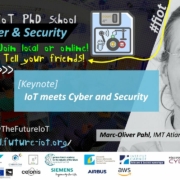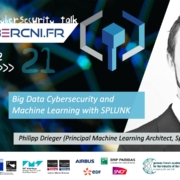[TALK25] Increasing Internet security by bridging research and operations, Cristian Hesselman (SIDN Labs, NL)
On Wed, Dec 7th, 2022, 2pm CET, Cristian Hesselman (SIDN Labs, NL), will talk about “Increasing Internet security by bridging research and operations“. You are cordially invited to join the free live stream on youtube and LinkedIn! Please share the link https://talk.cybercni.fr/25 with your interested friends!
Trailer: https://youtu.be/Ia98UVpHUXA
LinkedIN Event: https://www.linkedin.com/video/event/urn:li:ugcPost:7003082519126409218/
Facebook Event: https://www.facebook.com/events/1343286932876302/
Youtube: https://www.youtube.com/watch?v=jnSyKh6RKg8&list=PLdftPKA9mTfaDJxqwexil2mPhUFIA9ITd
Stream redirect (for every edition): https://TALK.cyberCNI.fr/stream
Newsletter with invitations: Subscription on https://TALK.cyberCNI.fr
Help us spreading the news
The best talks are those with an interested diverse audience! Therefore, please use the following media to spread the news in your networks: Iconic image, Video announcement with embedded subtitles. Thank you!
Abstract
Ever wondered what’s behind that language on “technology transfer” in research proposals? Well, that’s one of our key activities at SIDN Labs. We’re a research team that aims to increase the operational security and resilience of the Internet infrastructure by bridging the worlds of academia and operations, specifically in the space of large-scale Internet measurements and technology development. We very often work with academic institutions (e.g., the University of Twente, the University of Southern California, and Delft University of Technology) and other research labs (e.g., NLnet Labs) and we use the results of these joint cybersecurity projects to further improve the services of SIDN, the not-for-profit operator of the Netherlands’ national top-level domain on the Internet, .nl. We also publish these results so that everyone in the Internet community can use them as well. In this talk, I’ll discuss a few example research projects and how we used their output for SIDN’s services.
Cristian Hesselman
Cristian Hesselman directs SIDN Labs, the research arm of the operator of .nl top-level domain, SIDN. His work focuses on advancing the security of the Internet to support our digital society. He is also a part-time professor at the University of Twente, a researcher at the Twente University Centre for Cybersecurity Research (TUCCR), and he chairs the board of directors of NLnet Labs. Personal website: www.hesselman.net.
SIDN Labs, Netherlands
SIDN Labs is the research arm of SIDN, the not-for-profit operator of the Netherlands’ national top-level domain on the Internet, .nl. SIDN Labs focuses on applied research to increase the operational security of the Internet infrastructure, in particular in the areas of domain name security, Internet core protocols, and their future evolutions. Websites: www.sidn.nl, www.sidnlabs.nl, stats.sidnlabs.nl.
Talk.cybercni.fr
The Cyber CNI Lecture Series is a free monthly event that typically takes place on the last Wednesday of the month from 2pm to 3h30pm CET.
The event consists of a 45-minute expert presentation followed by a 45-minute discussion.
The Cyber CNI Speaker series aims to raise awareness and understanding of cyber security issues among all audiences. It aims to enable an ongoing dialogue between experts from industry and academia and the general public (citizens, families, small and large businesses, public organizations, etc.). All of us are concerned.
The events are broadcast live on Youtube (https://talk.cybercni.fr/) and LinkedIn, allowing worldwide remote participation – including a tool to participate in the discussion.
You can add the event calendar via ICS, webcal, HTML.
How the digital transformation is changing our lives
The COVID-19 pandemic has shown all of us the benefits of information technology. It allows us to work at a distance, to live at a distance, and most importantly, to keep in touch at a distance – with younger and older people, those closest to us, and even make new contacts.
Our society relies more and more on information and operational technologies. Examples include water, energy, heat and cooling supply, communications, healthcare, production and processing of goods, transportation, national security, banking, research and education, and food production.
What all these areas have in common is that they make intensive use of networked distributed computer systems. These systems can be attacked in many ways. This is no longer just a problem for computer “pros” because computer systems are essential to all of us. The effects of “cyber-attacks” range from power outages to the collapse of the health care or banking sectors.
Program and registration: https://talk.cybercni.fr/

